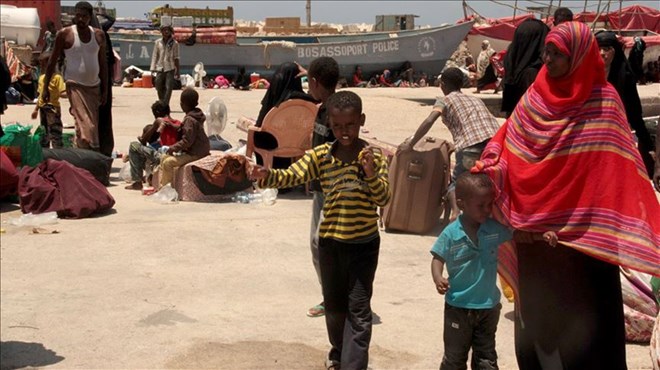
Sunday May 10, 2020

Children of Hani Shamshi, 44, a Somali refugee mother at a semi-arid Dadaab camp in Kenya are gazing at the kitchen at Iftar, the time for breaking fast during Ramadan, hoping something will be cooked. But there is nothing. They may again go to sleep with hungry stomachs.
"I have nothing to give to children. It's sad to watch your children starve. During Ramadan, food is also expensive and we can't do hard labor due to seething temperatures and fasting," she said.
"This is a Ramadan like I've never witnessed since I was born. Poor refugee families like me were used to receiving food parcels. Many refugees don't have money to buy anything. We were dependent on aid from philanthropic agencies," she added.
Shamshi said she had not taken anything at Sahur, the meal consumed before fasting begins at dawn.
"I'm still observing fast, no matter, it'll have a toll on my body. We live in abject poverty. This Ramadan makes me sad, but I hope the help will come," she said.
Nearly half a million Somali refugees camping in the Dadaab and Kakuma refugee camps in the East African country of Kenya are facing a tough Ramadan this year due to restrictions imposed to stem the spread of COVID-19, or novel coronavirus, pandemic.
Even though movement in and out of the camps are banned, aid agencies have been exempted. Still, nobody is coming forward to help, say residents.
Every year, refugees used to receive donations, as well as food and essential hygiene packs, during Ramadan. But this year, even with 15 days of fasting are already over, nothing has come forward as the pandemic is believed to have affected donors.
Speaking to Anadolu Agency on the phone, Gargaaro, a Somali refugee from the Dadaab refugee camp, said his experience with the 2020 Ramadan was full of remorse.
"My experience with Ramadan has been sad. Muslims usually give charity during this time. For us, we used to receive food donations from organizations such as TIKA [Turkish Cooperation and Coordination Agency] and SUPKEM [Supreme Council of Kenya Muslims] among many others," she said.
Recalling the experience of Ramadan over past years, she said the camp residents were used to receiving camel meat, mutton, salt, cooking oil, soaps, cereals, sugar and maize flour.
"This year, nothing has come so far," said Gargaaro, who asked to be identified with only her single name.
She appealed to donors and Islamic organizations to send food and help. "We know they are dealing with the coronavirus but they should not forget us," she pleaded.
Mosques closed
Like other places of worship, many mosques in Kenya have closed their doors following a directive from authorities. Many poor Muslim families across Kenya used to rely on food distributed in mosques.
The UNHCR has appealed to donors seeking aid for refugees in Kenya during Ramadan. The agency has warned that the COVID-19 pandemic has made refugees more vulnerable due to their limited access to clean water, quality sanitation and hygiene.
UNHCR Representative in Kenya Fathiaa Abdalla said during this difficult period, any contribution from organizations to individuals whether big or small was welcome and would make a real difference.
"UNHCR Kenya's total funding needs in response to the COVID-19 pandemic currently totals $4.9 million and is part of the COVID-19 Emergency Appeal for Kenya, which was launched in April by Kenyan government, the UN and other humanitarian partners," said a statement issued by the UN body.